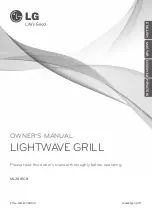
WARNING:
Some dust created by power sanding, sawing, grinding, drilling, and other
construction activities contains chemicals known to the State of California to cause cancer,
birth defects or other reproductive harm. Some examples of these chemicals are:
• lead from lead-based paints,
• crystalline silica from bricks and cement and other masonry products, and
• arsenic and chromium from chemically-treated lumber.
Your risk from these exposures varies, depending on how often you do this type of
work. To reduce your exposure to these chemicals: work in a well ventilated area, and
work with approved safety equipment, such as those dust masks that are specially
designed to filter out microscopic particles.
•
Avoid prolonged contact with dust from power sanding, sawing, grinding, drilling,
and other construction activities. Wear protective clothing and wash exposed areas
with soap and water.
Allowing dust to get into your mouth, eyes, or lay on the skin may
promote absorption of harmful chemicals.
WARNING:
Use of this tool can generate and/or disperse dust, which may cause
serious and permanent respiratory or other injury
. Always use NIOSH/OSHA
approved respiratory protection appropriate for the dust exposure. Direct particles
away from face and body.
WARNING:
ALWAYS use safety glasses. Everyday eye glasses are NOT safety
glasses. Also use face or dust mask if cutting operation is dusty.
ALWAYS WEAR CERTIFIED SAFETY EQUIPMENT:
•
ANSI Z87.1 eye protection (CAN/CSA Z94.3)
•
ANSI S12.6 (S3.19) hearing protection
•
NIOSH/OSHA/MSHA respiratory protection
SYMBOLS
The label on your tool may include the following symbols. The symbols and their definitions are as follows:
V ..................volts A ...................amperes
Hz ................hertz W ..................watts
min ..............minutes
or AC .......alternating current
or DC ...direct current
no .................no load speed
................Class I Construction
..................earthing terminal
(grounded)
................safety alert symbol
................Class II Construction
.../min or rpm...revolutions or
(double insulated)
reciprocation per minute
............Read instruction manual before use
..................Use proper respiratory protection
................Use proper eye protection
..................Use proper hearing protection
IMPORTANT SAFETY INSTRUCTIONS FOR BATTERY CHARGERS
SAVE THESE INSTRUCTIONS:
This manual contains important safety instructions for
battery chargers.
• Before using charger, read all instructions and cautionary markings on charger, battery
pack, and product using battery pack.
WARNING:
Shock hazard.
Do not allow any liquid to get inside charger.
CAUTION:
Burn hazard.
To reduce the risk of injury, charge only designated
BLACK+DECKER
batteries. Other types of batteries may burst causing personal injury and damage.
CAUTION:
Under certain conditions, with the charger plugged in to the power supply, the
charger can be shorted by foreign material. Foreign materials of a conductive nature such as,
but not limited to, steel wool, aluminum foil, or any buildup of metallic particles should be kept
away from charger cavities. Always unplug the charger from the power supply when there is
no battery pack in the cavity. Unplug charger before attempting to clean.
•
DO NOT attempt to charge the battery pack with any chargers other than the ones
in this manual.
The charger and battery pack are specifically designed to work together.
•
These chargers are not intended for any uses other than charging designated
BLACK+DECKER rechargeable batteries.
Any other uses may result in risk of fire,
electric shock or electrocution.
•
Do not expose charger to rain or snow.
•
Pull by plug rather than cord when disconnecting charger. This will reduce risk of
4




































